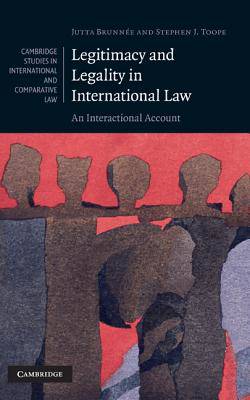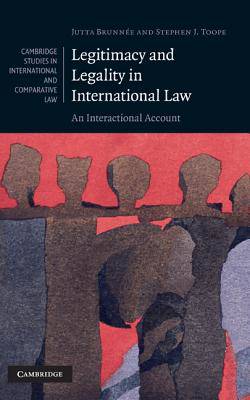
- Afhalen na 1 uur in een winkel met voorraad
- Gratis thuislevering in België vanaf € 30
- Ruim aanbod met 7 miljoen producten
- Afhalen na 1 uur in een winkel met voorraad
- Gratis thuislevering in België vanaf € 30
- Ruim aanbod met 7 miljoen producten
Zoeken
Legitimacy and Legality in International Law
An Interactional Account
Jutta Brunnee, Stephen J Toope
€ 213,45
+ 426 punten
Uitvoering
Omschrijving
It has never been more important to understand how international law enables and constrains international politics. By drawing together the legal theory of Lon Fuller and the insights of constructivist international relations scholars, this book articulates a pragmatic view of how international obligation is created and maintained. First, legal norms can only arise in the context of social norms based on shared understandings. Second, internal features of law, or 'criteria of legality', are crucial to law's ability to promote adherence, to inspire 'fidelity'. Third, legal norms are built, maintained or destroyed through a continuing practice of legality. Through case studies of the climate-change regime, the anti-torture norm, and the prohibition on the use of force, it is shown that these three elements produce a distinctive legal legitimacy and a sense of commitment among those to whom law is addressed.
Specificaties
Betrokkenen
- Auteur(s):
- Uitgeverij:
Inhoud
- Aantal bladzijden:
- 436
- Taal:
- Engels
- Reeks:
- Reeksnummer:
- nr. 67
Eigenschappen
- Productcode (EAN):
- 9780521880657
- Verschijningsdatum:
- 5/08/2010
- Uitvoering:
- Hardcover
- Formaat:
- Genaaid
- Afmetingen:
- 152 mm x 229 mm
- Gewicht:
- 807 g

Alleen bij Standaard Boekhandel
+ 426 punten op je klantenkaart van Standaard Boekhandel
Beoordelingen
We publiceren alleen reviews die voldoen aan de voorwaarden voor reviews. Bekijk onze voorwaarden voor reviews.







